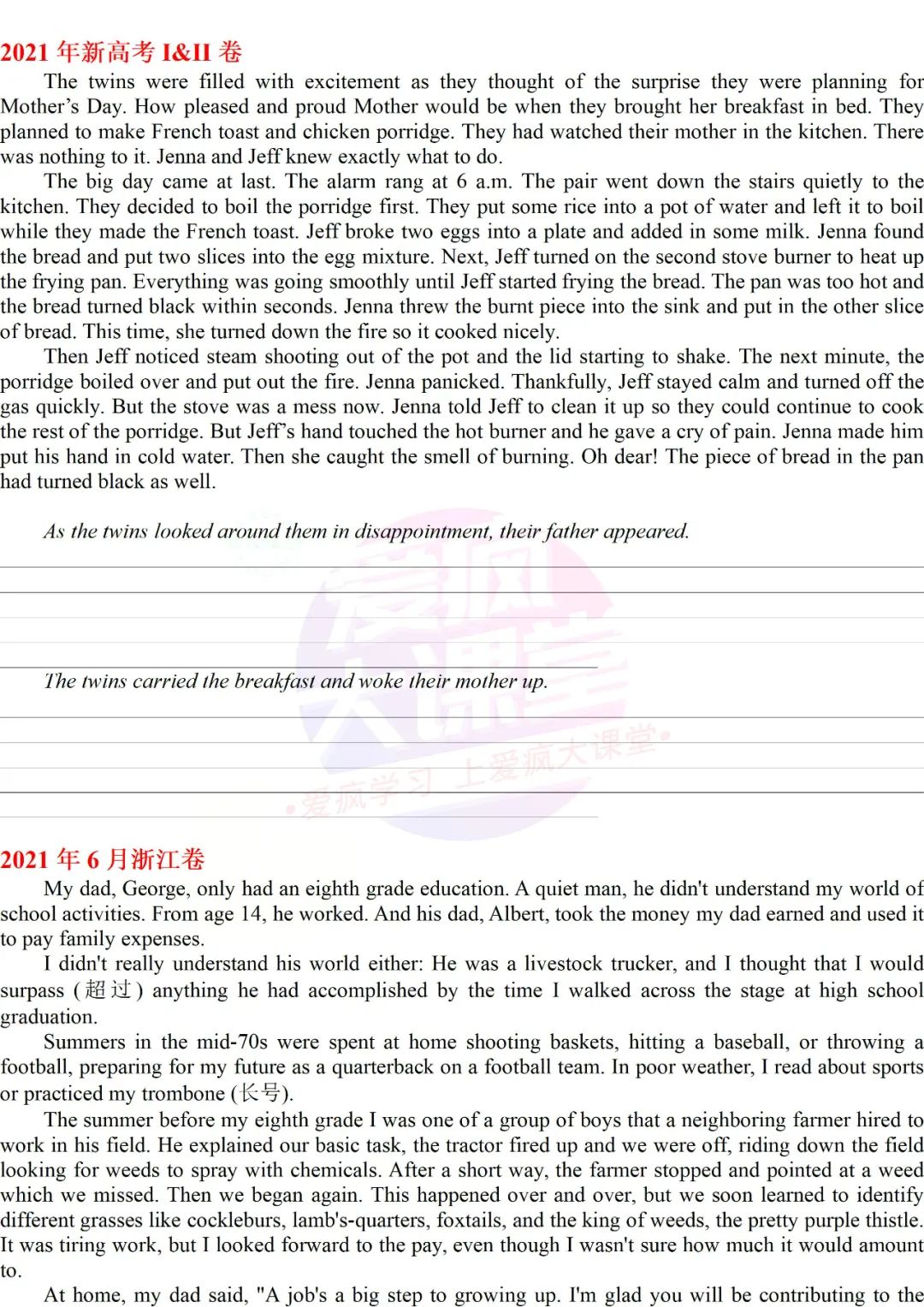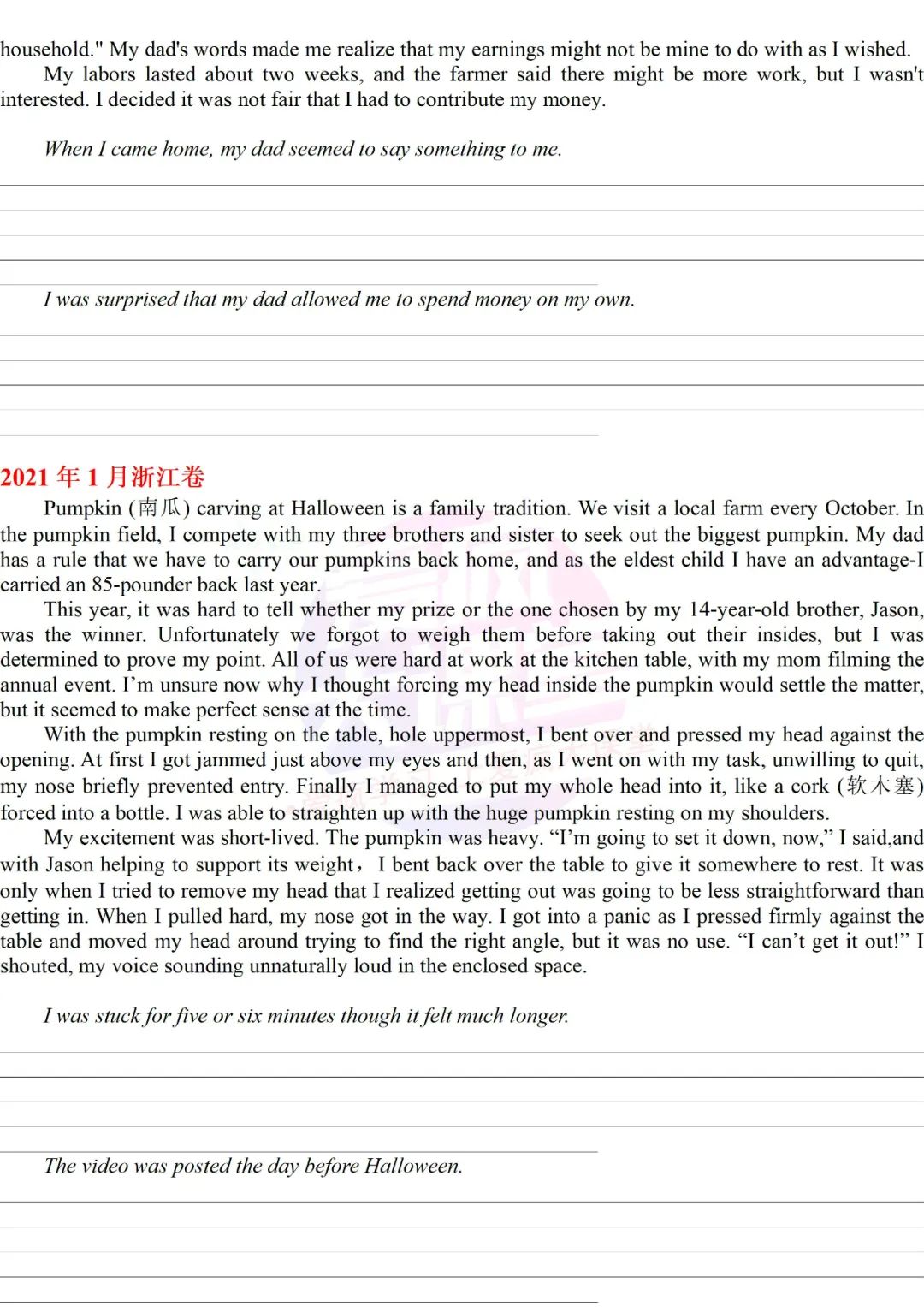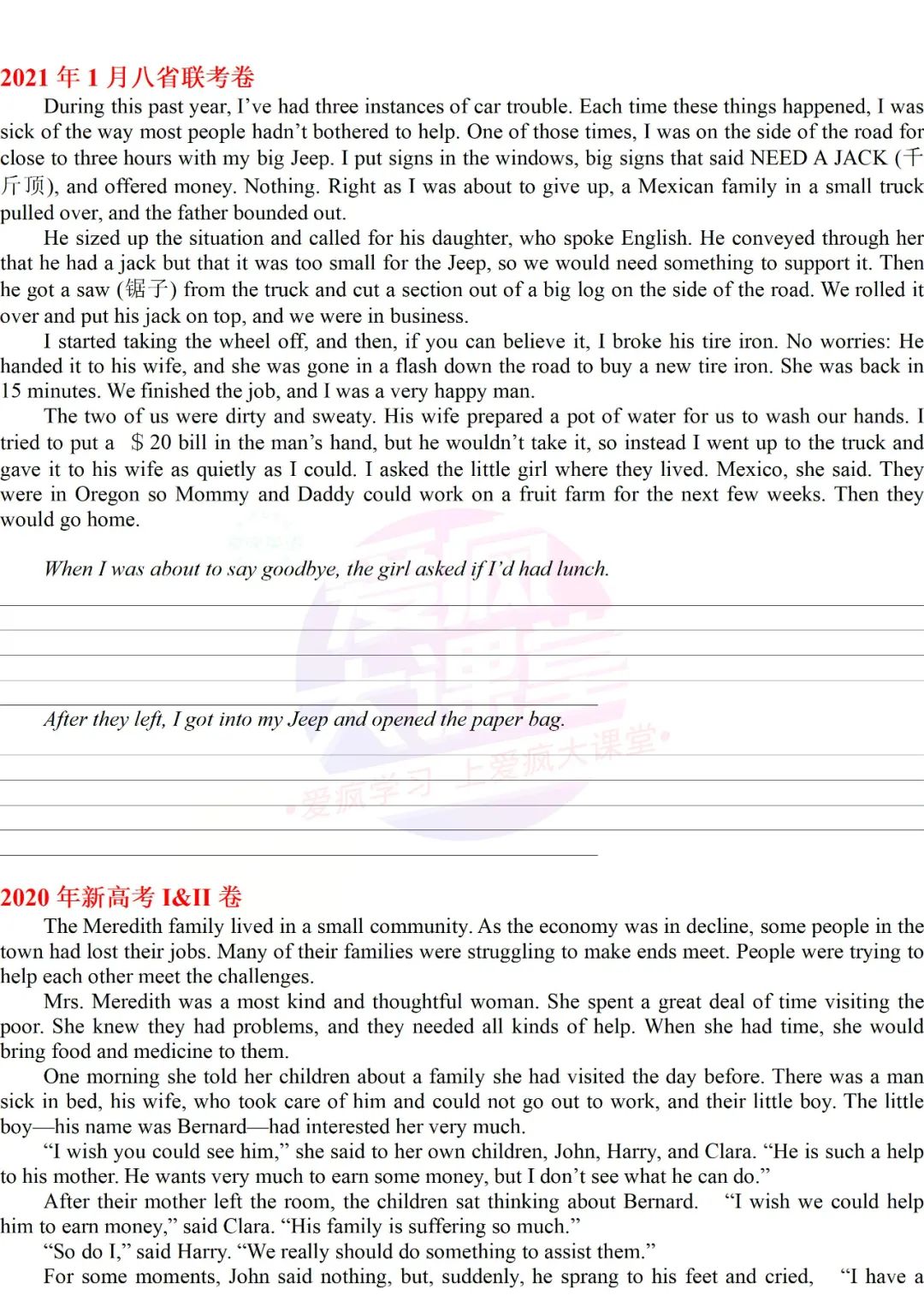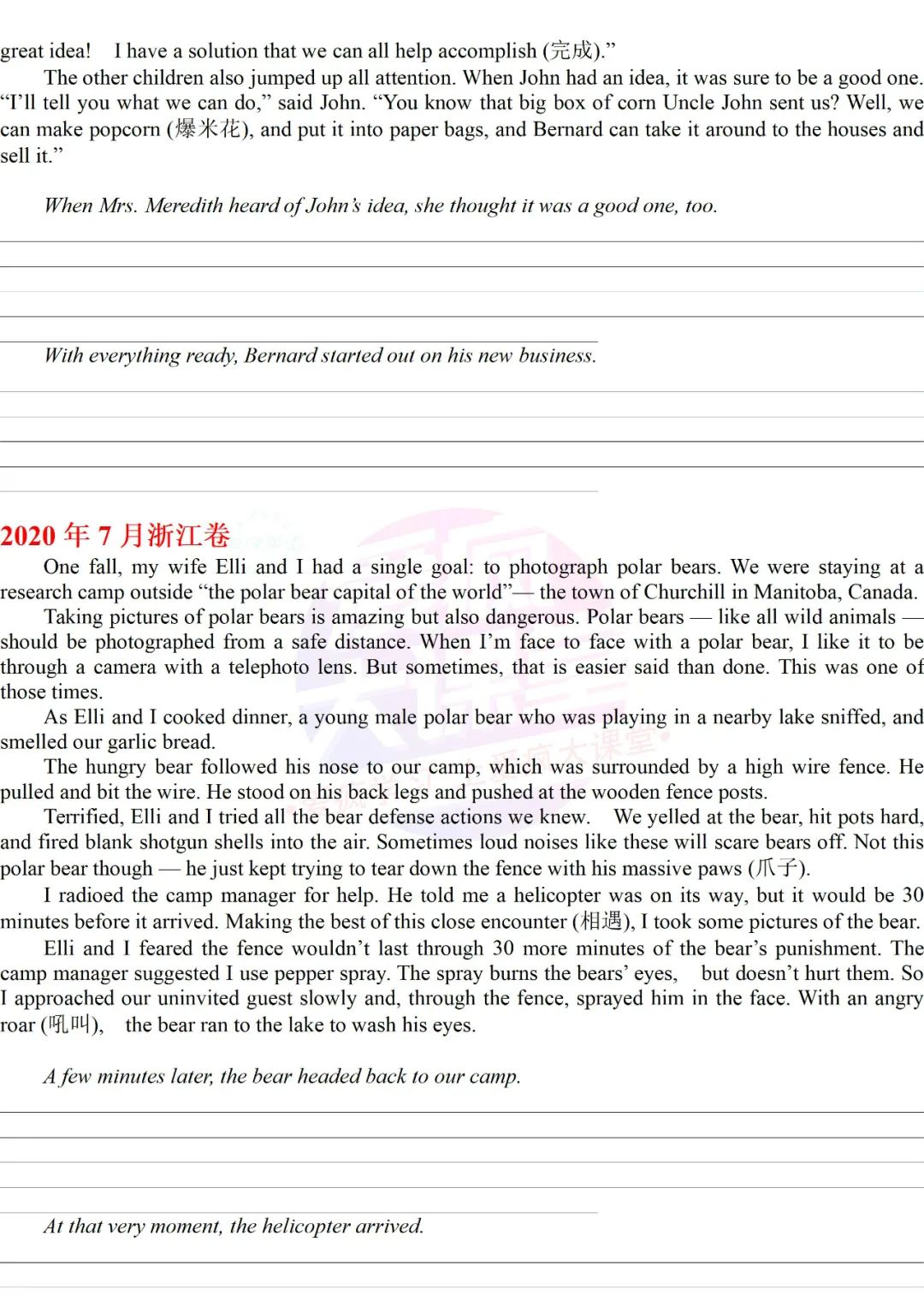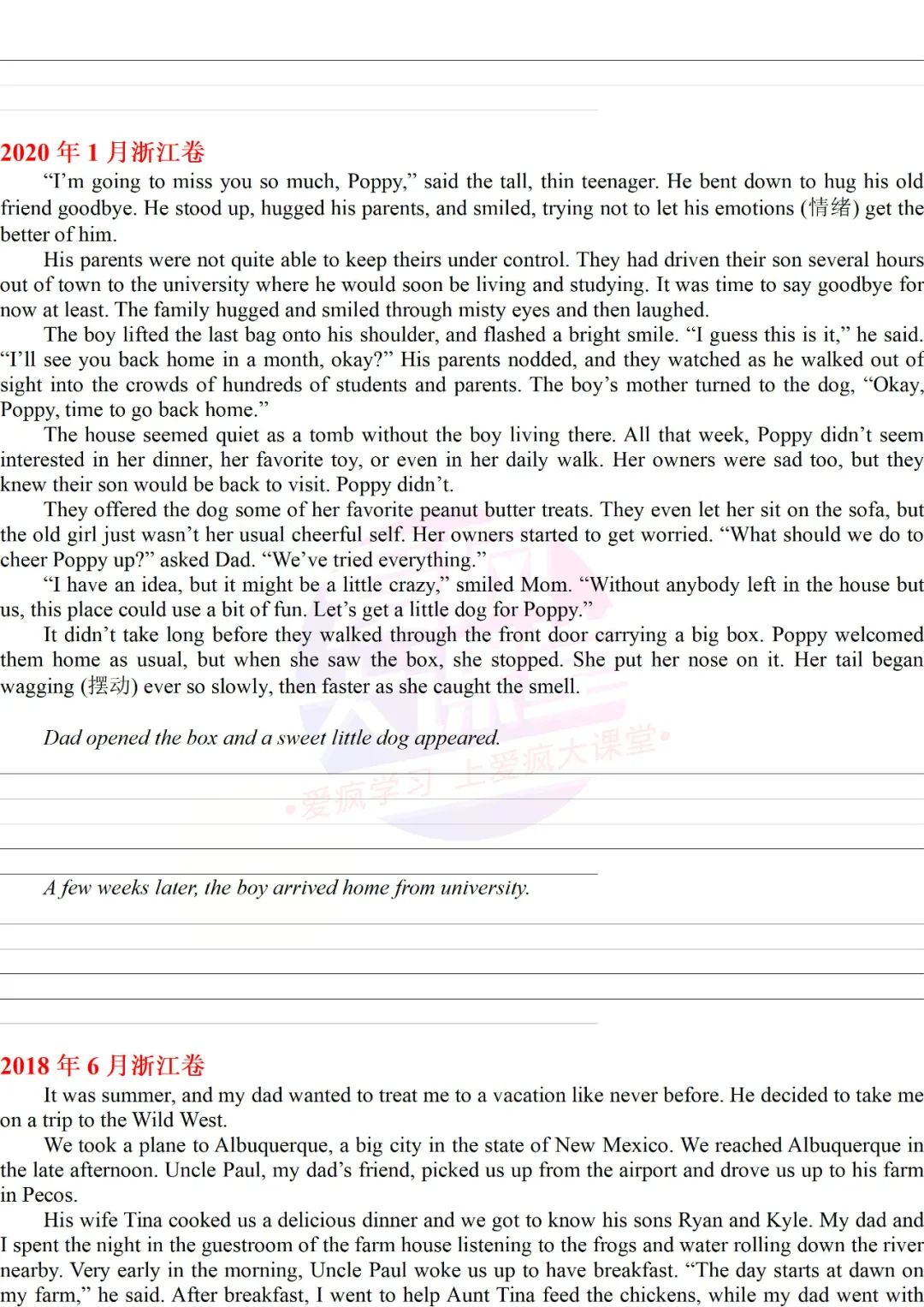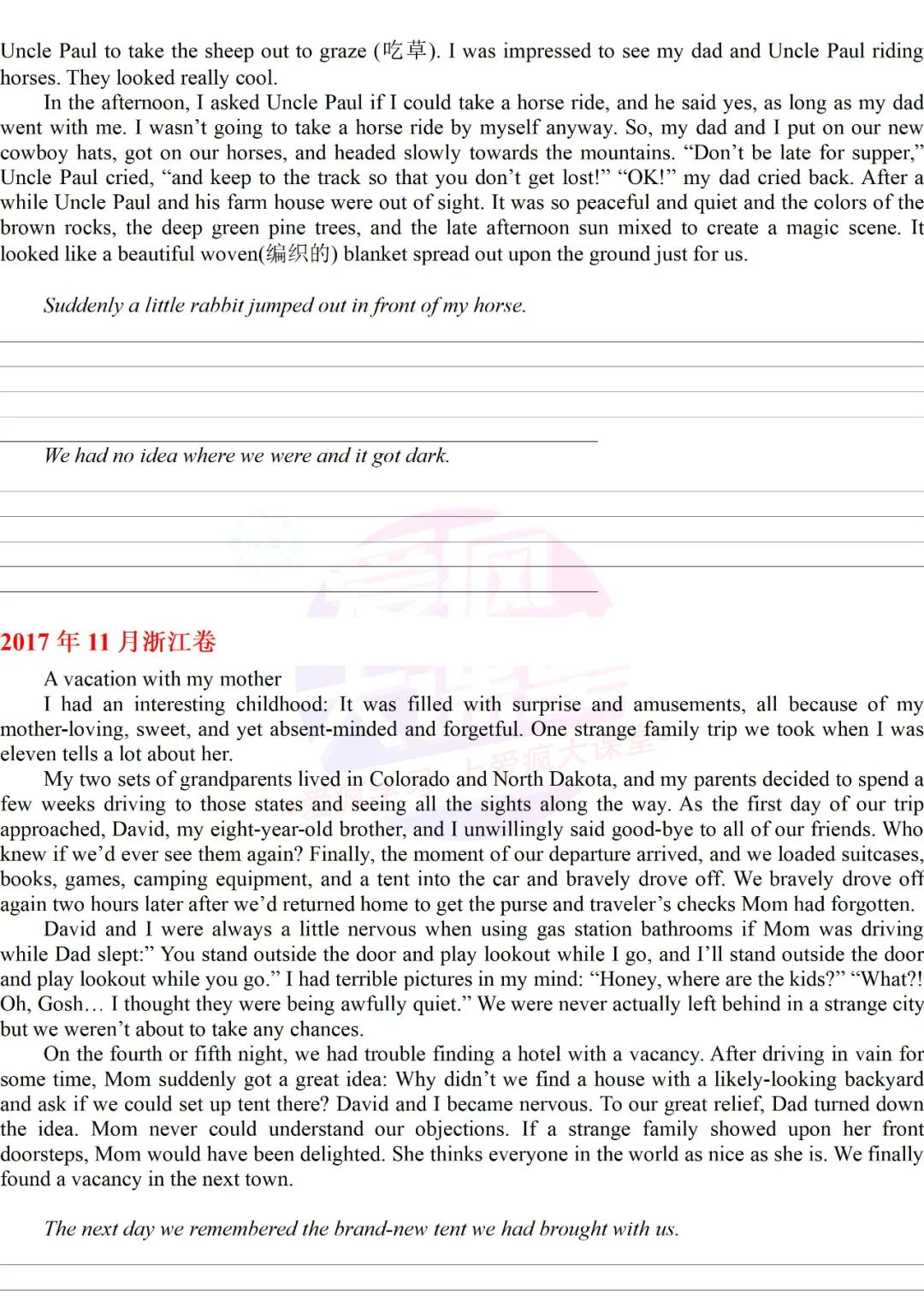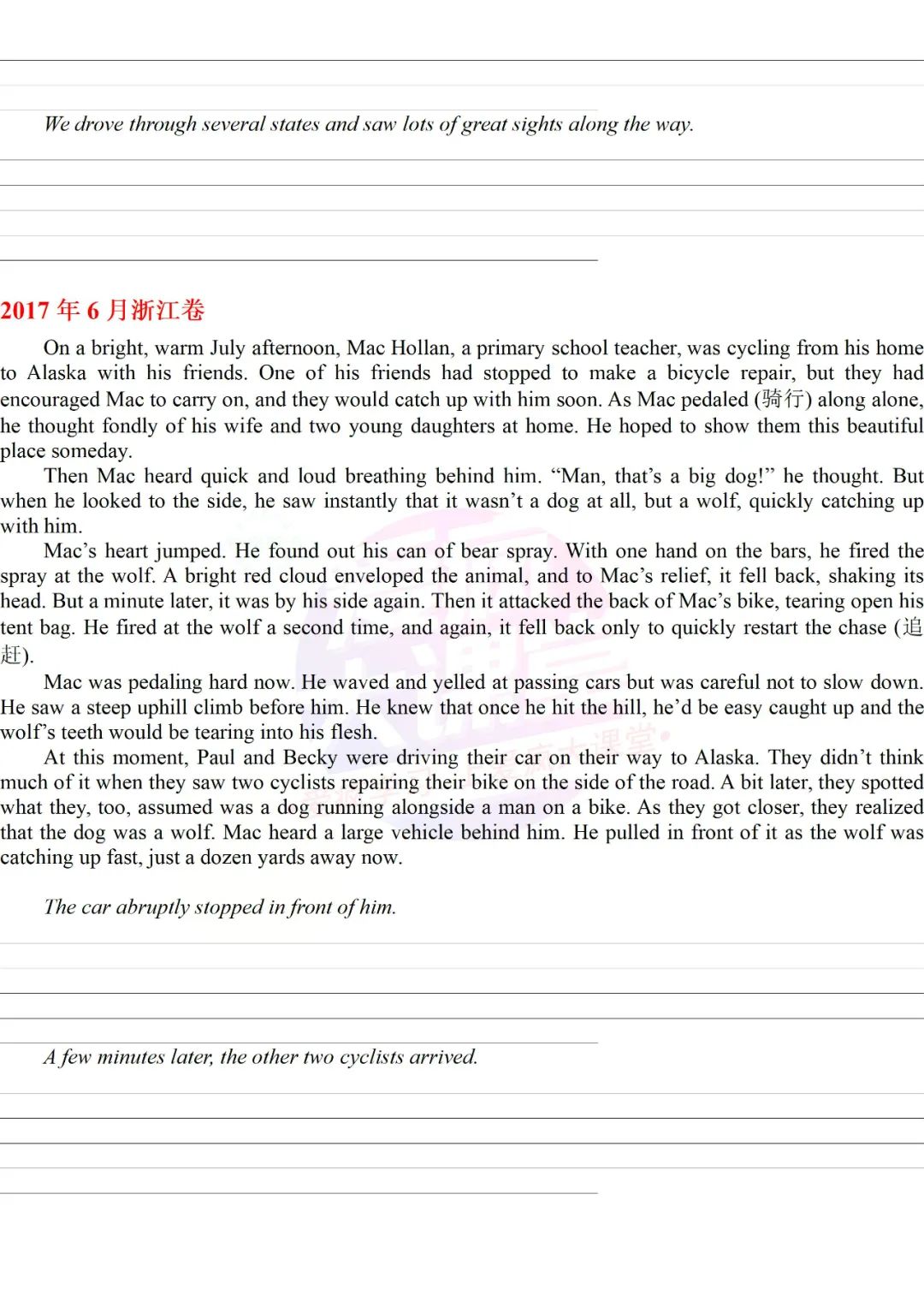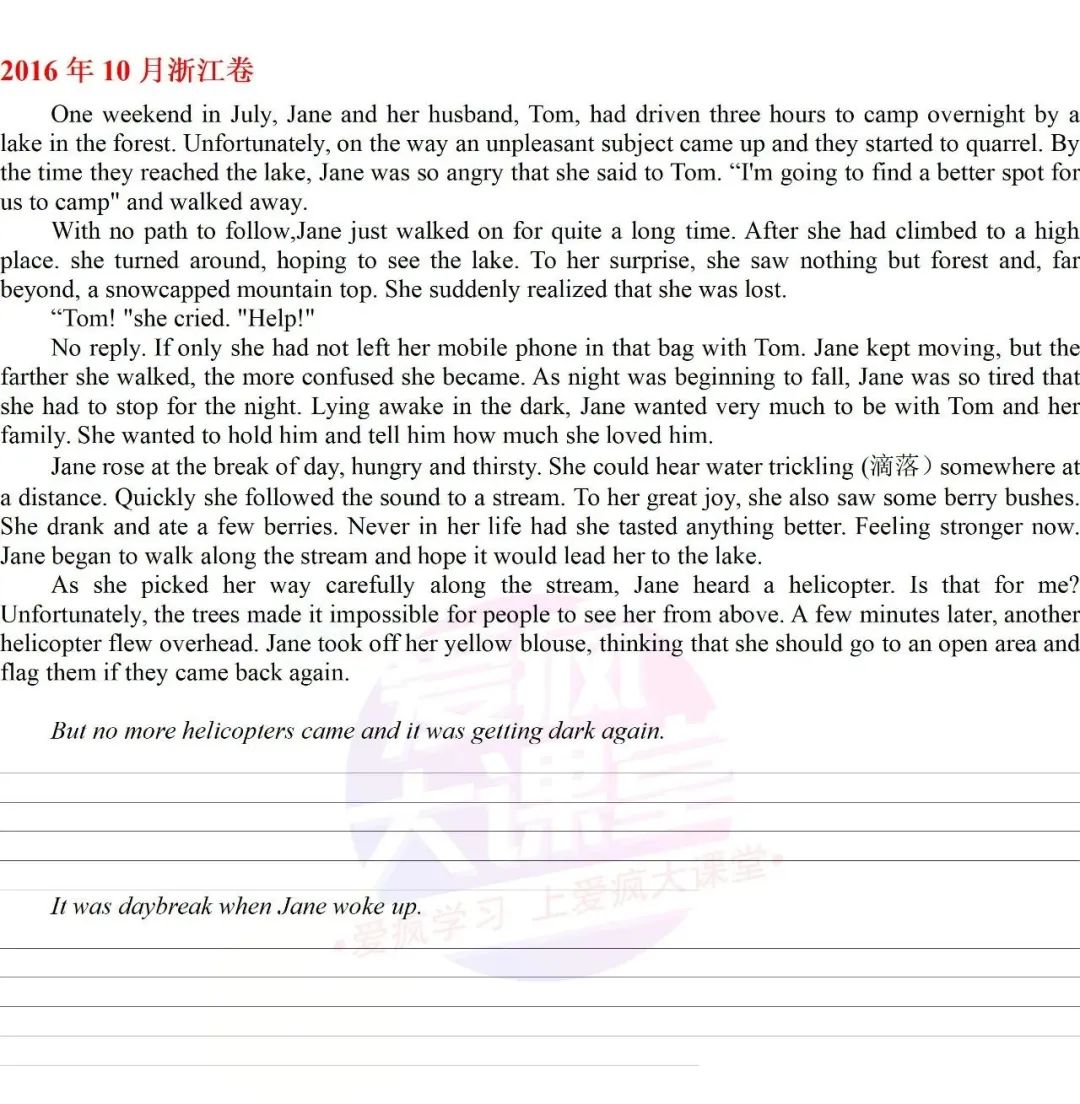
本次特别汇编历年高考英语读后续写真题
旨在为教师提供一站式查找和分析历年题目的平台,帮助教师在二轮复习过程中把握该题型命题规律,优化教学策略。同时,为学生提供丰富的实战练习,旨在通过大量真题训练,深化理解,提升学生自身英语写作水平。
Last summer, Hilda worked as a volunteer with dolphin trainers at a sea life park. Her job was to make sure the tanks were free of any items so that the trainers could train the dolphins to fetch specific items. However, one day after cleaning, one of the dolphins, Maya, presented Hilda with a candy wrapper from the tank. When Katherine, the trainer, saw this, she blamed Hilda for her carelessness. Upset but not discouraged by this event, Hilda decided to do some spying on Maya.
The next morning, Hilda arrived at the park early. She put on her scuba gear(水下呼吸器)and jumped into the tank for her usual, underwater sweep. Finding nothing in the tank, she climbed out of the water just in time to see Katherine jumping in on the other side. After what happened yesterday, Hilda knew what she was doing. She watched as Katherine performed her underwater search, but Hilda wasn't surprised when she surfaced empty-handed.
During the tank sweeps, Maya had been swimming playfully, but now the dolphin stopped suddenly and swam to the back part of the tank where the filter (过滤) box was located. She stuck her nose down behind the box and then swam away. What was Maya doing back there? Hilda wondered. She jumped back into the water and swam over to take a look behind the box, and her question was answered. Hilda then swam across the tank following Maya's path and emerged from the water to find Katherine removing her scuba gear. As Katherine turned around, her mouth dropped open. There was Maya at the edge of the tank with a comb(梳子) in her mouth waiting for her treat.
“Maya! Where did you get that?” demanded Katherine, taking the comb and throwing her a fish. “I know where she got it,” declared Hilda climbing out of the tank with a handful of items still wet from their watery, resting place. “What's all this?” Katherine asked, obviously confused.
“This is Maya's secret,” Hilda said with a big smile.
______________________________________________________________________
Now Katherine realized what had been going on.
______________________________________________________________________
Eva spent the first week of high school trying to keep her head above water. One of the major headaches for her was finding her way in the huge school building. It was a six-story building. On each floor, hallways stretched in four directions, leading to classrooms, laboratories, and teachers’ offices. Somewhere in the building, there was also a library, a cafeteria, and a gym.
Having a poor sense of direction, Eva found it impossible to get around in such a huge building. All the different hallways and rooms were too much to think about, let alone commit to memory. She decided that she would memorize where her classes were and then pretend that the rest of the place didn’t exist.
In her fast P.E. class, Eva was shocked when Coach Pitt announced that everyone had to run one mile around the track outside. She searched the faces of her classmates for signs of panic. There was nothing she feared more than having to run a whole mile. To Eva, “a mile” was used to describe long distances. It was ten miles from her home to her grandfather’s, and that always seemed like a long way, even in a car!
When Coach Pitt blew his whistle (哨子), Eva figured she would be left in the dust. However, while some of her classmates edged ahead, others actually fell behind. “It’s just the beginning,” she thought. “I’ll come in last for sure.”
Soon Eva began to breathe hard, with her heart pounding and legs shaking. Feeling desperate, Eva started using a mind wick on herself. She stopped thinking about the word “mile.” Instead, she focused on reaching the shadow east on the track by an oak tree up ahead. Then she concentrated on jogging to the spot where the track curved (拐弯). After that, she tried to see if she could complete her first lap. One lap turned into two, then three, then four.
When Coach Pitt said “Nice work!” to her at the finish line, Eva was surprised.
_______________________________________
Eva decided to use the same trick to deal with the school building.
_______________________________________
When I was in middle school, my social studies teacher asked me to enter a writing contest, I said no without thinking. I did not love writing. My family came from Brazil, so English was only my second language. Writing was so difficult and painful for me that my teacher had allowed me to present my paper on the sinking of the Titanic by acting out a play, where I played all the parts. No one laughed harder than he did.
So, why did he suddenly force me to do something at which I was sure to fail? His reply: “Because I love your stories. If you’re willing to apply yourself, I think you have a good shot at this.” Encouraged by his words, I agreed to give it a try.
I chose Paul Revere’s horse as my subject. Paul Revere was a silversmith(银匠) in Boston who rode a horse at night on April 18, 1775 to Lexington to warn people that British soldiers were coming. My story would come straight from the horse’s mouth. Not a brilliant idea, but funny, and unlikely to be anyone else’s choice.
What did the horse think as he sped through the night? Did he get tired? Have doubts? Did he want to quit? I sympathized immediately. I got tired. I had doubts. I wanted to quit. But, like Revere’s horse, I kept going. I worked hard. I checked my spelling. I asked my older sister to correct my grammar. I checked out a half-dozen books on Paul Revere from the library. I even read a few of them.
When I handed in the essay to my teacher, he read it, laughed out loud and said, “Great. Now, write it again.”
I wrote it again, and again and again. When I finally finished it, the thought of winning had given way to the enjoyment of writing. If I didn’t win, I wouldn’t care.
A few weeks later, when I almost forgot the contest, there came the news.
__________________________________
I went to my teacher’s office after the award presentation.
__________________________________
My husband and I enjoy seeing life through the eyes of our children. It’s amazing to watch as they discover their world. While we were outdoors last summer enjoying the sunshine, our oldest daughter, Kaytlin, called me to the doorway. Beneath the steps was a baby red squirrel. We watched it from a distance, not wanting to disturb it or scare off its mother. But after a long wait—and looking all around our house for signs of a nest or a mother—we realized the tiny squirrel was lost. Shaking terribly, he was weak, thin, and hungry. We tried to find an expert to help, but the Inland Fisheries and Wildlife website showed that there were no wildlife experts in our area. After some quick research, we concluded that the best way to give the squirrel a fighting chance was to care for him ourselves. So a trip to the local store for milk and supplies was in order. More research taught us how much to feed him, how to estimate his age, how and when to wean (断奶) him, and that we should let him go as soon as he could survive on his own.Our daughters and I took turns in feeding “Squirt.” Kaytlin took on the most responsibility. She taught him to eat from a bottle, and she woke in the night for his feeds. To our relief, Squirt soon became healthy and strong. Within a few weeks he became more active. He would chatter (吱吱叫) for his next meal, playfully go around the girls, and lie down on them for sleep. It wasn’t long before he was weaned onto solid food and reintroduced to the wild. His first few visits to the great outdoors were funny. Just like a child, he would play in the grass some and then run back to Kaytlin for safety. Soon she had him climbing trees and finding nest material. One day in the trees, Squirt met up with a family of gray squirrels.________________________________ One night, Squirt didn’t come back to our house and it rained hard. ________________________________ I was invited to a cookout on an old friend’s farm in western Washington. I parked my car outside the farm and walked past a milking house which had apparently not been used in many years. A noise at a window caught my attention, so I entered it. It was a hummingbird (蜂鸟), desperately trying to escape. She was covered in spider-webs (蛛网) and was barely able to move her wings. She ceased her struggle the instant I picked her up. With the bird in my cupped hand, I looked around to see how she had gotten in. The broken window glass was the likely answer. I stuffed a piece of cloth into the hole and took her outside, closing the door securely behind me. When I opened my hand, the bird did not fly away; she sat looking at me with her bright eyes. I removed the sticky spider-webs that covered her head and wings. Still, she made no attempt to fly. Perhaps she had been struggling against the window too long and was too tired? Or too thirsty? As I carried her up the blackberry-lined path toward my car where I kept a water bottle, she began to move. I stopped, and she soon took wing but did not immediately fly away. Hovering (悬停), she approached within six inches of my face. For a very long moment, this tiny creature looked into my eyes, turning her head from side to side. Then she flew quickly out of sight. During the cookout, I told my hosts about the hummingbird incident. They promised to fix the window. As I was departing, my friends walked me to my car. I was standing by the car when a hummingbird flew to the center of our group and began hovering. She turned from person to person until she came to me. She again looked directly into my eyes, then let out a squeaking call and was gone. For a moment, all were speechless. Then someone said, “She must have come to say goodbye.” A few weeks later, I went to the farm again.______________________________________ I was just about to leave when the hummingbird appeared. ______________________________________ It was the day of the big cross-country run. Students from seven different primary schools in and around the small town were warming up and walking the route (路线) through thick evergreen forest. I looked around and finally spotted David, who was standing by himself off to the side by a fence. He was small for ten years old. His usual big toothy smile was absent today. I walked over and asked him why he wasn’t with the other children. He hesitated and then said he had decided not to run. What was wrong? He had worked so hard for this event! I quickly searched the crowd for the school’s coach and asked him what had happened. “I was afraid that kids from other schools would laugh at him,” he explained uncomfortably. “I gave him the choice to run or not, and let him decide.” I bit back my frustration (懊恼). I knew the coach meant well—he thought he was doing the right thing. After making sure that David could run if he wanted, I turned to find him coming towards me, his small body rocking from side to side as he swung his feet forward. David had a brain disease which prevented him from walking or running like other children, but at school his classmates thought of him as a regular kid. He always participated to the best of his ability in whatever they were doing. That was why some of the children thought it unusual that David had decided to join the cross-country team. It just took him longer—that’s all. David had not missed a single practice, and although he always finished his run long after the other children, he did always finish. As a special education teacher at the school, I was familiar with the challenges David faced and was proud of his strong determination. We sat down next to each other, but David wouldn’t look at me._____________________________________ I watched as David moved up to the starting line with the other runners._____________________________________ I needed to do something in my community in order to complete the community service hours required to graduate from high school. Some of my friends had signed up to spend time at a soup kitchen, so I did, too. It seemed like a good thing to do. I thought that we would just be passing out dinners to those in need, but I found out we would be doing everything from preparing to serving the dinner. We began preparing the food, from mixing salad dressing to separating frozen meat. Much still needed to be done before dinner was served, but already outside the building many homeless people were gathering. It wasn't until a couple of hours later that we opened the doors and began serving dinner. As the line of people came toward me, I got a little scared. I'd come face to face with the homeless: How should I act? How would they treat me? Would they hate me for having more than they did? While some of the people looked very friendly, some of them looked so dangerous. I didn't have too much time to worry about it. I was assigned to serve the salad with the lady next to me. She smiled at me and said if I needed help, she'd be right there, which I found quite comforting. I had never seen so many people wanting food. They were of all ages and nationalities. Most of them wore clothes that were torn and dirty. Some looked like they had tally given up on life, while others seemed to be making the best of the situation, smiling and joking. Some were better off than others, but they all needed a good meal and a warm place to eat. It saddened me to think of how many people there were who didn't have a place to call home and the only food they got came from a soup kitchen. As they came in my direction, I put on my brightest and happiest smile.___________________________________ I was so happy that I had earned my service hours in this way.___________________________________ When Dr. Henderson was assigning (指定) project mates for his psychology class, I secretly hoped that he would pair me with my best friend or at least a classmate I could have some fun with. Above all, I hoped he wouldn’t assign me to work with the fiercely competitive and extremely serious fellow who always wore dark clothes and apparently had a personality to match. As fate (命运) would have it, Dr. Henderson very deliberately matched everyone in class and announced that I would be working with the one person in class I wanted to avoid. I went up to my new teammate and introduced myself. He looked at me as though I weren’t there. I felt he treated me as though I would hold him back and probably make him fail to get an A in the course. He wasn’t mean or abusive; he just gave me the impression that he could do whatever project we dreamed up better if he did it alone. Needless to say, I didn’t look forward to an entire term of being brushed off, but I tried to make the best of it and didn’t say anything for fear that I would make things worse. The project required each team to develop a hypothesis (假说), set up an experiment to test the hypothesis, do the statistical analysis and present the findings. Whatever grade the team received would be shared by both students. When my teammate and I met to discuss our project, I was uneasy. Here was this challenging student who had a reputation for single-mindedness and good grades — the exact opposite of me. I actually wanted to drop the class at one point, but stopped short because I didn’t want to give him the satisfaction of my chickening out. I decided to stick to it no matter what. After long discussions we somehow agreed to do a study on the psychological well-being of teenagers. I wasn’t sure what it meant exactly, but at least we had a topic. We started to meet regularly to draw up our plans.___________________________________ One day I got word that he was admitted to hospital for a serious disease.___________________________________
如需协助,请加Ivan老师(微信Ivanna98Ccc)咨询
扫码即可下载本文资料

↓↓↓ 点【阅读原文】,学习多一点!

